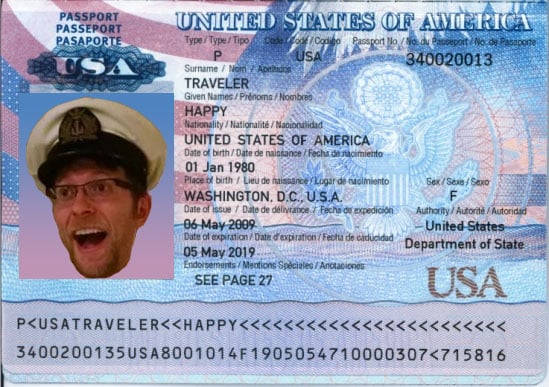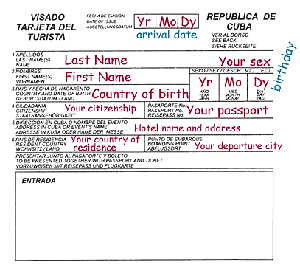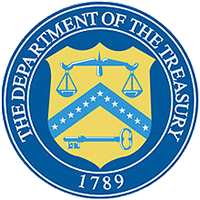This article is from our Cruising Cuba series where we're looking at some things you should know before you cruise to Cuba as a US citizen, even if you're a seasoned cruiser to other destinations.
We've answered some of your questions about cruise documentation in the past when covering passport requirements but you've probably heard confusing and conflicting information on cruising to Cuba as a US citizen. Let's clarify passport and visa requirements, as well as how the United States' travel restrictions to Cuba affect cruising to this tropical island.

Do you need a passport to cruise to Cuba?
Yes. Regardless of where you're from you'll need a passport to visit Cuba, even if on a "closed loop" cruise from the US. This means that if you've sailed on other cruises from US ports using only your birth certificate, you'll need a valid passport for your trip to Cuba. Remember that it can take six weeks to get a US passport, so don't delay. We recommend cruising on a passport regardless of where you're traveling, so while there is some additional expense, it's an important and useful document to have, and it's valid for 10 years.

It used to be that, while illegal, US citizens commonly traveled to Cuba by way of Mexico or other countries. The Cuban government, welcoming Americans, would not stamp US passport in an effort to keep Americans out of trouble back home. Because this is no longer an issue, feel free to have your passport stamped in Cuba, a free souvenir that you simply didn't want just a couple years ago.
Important note for persons born in Cuba:
If you were born in Cuba, but left on or after January 1st 1971, you'll need your US (or other) passport to go to and from the United States, but you'll need a Cuban passport for entry into and exit from Cuba. Those persons who let Cuba prior to 1971 do not need a Cuban passport but will be subject to the visa requirements we'll cover below.

Cuban Visa Requirements
A visa is essentially temporary authorization to enter another country. If you hold a US or Canadian passport you may not be accustomed to getting a visa for international travel, as the United States and Canada have agreements with many nations so that visas are not required - though there are still plenty of countries requiring Americans and Canadians* to get a visa for entry, and Cuba is one of them.
The good news is that for cruisers, getting a tourist visa (also known as a "tourist card") for Cuba is simple, because cruise lines generally take care of this for you. There is a $75 cost for each visa which will be added to your onboard account or built in to the cost of your cruise (check with your travel agent). Remember that if you'll be entering and exiting on a Cuban passport, this is not necessary. If you have questions about Cuban visas it's best to work with your travel agent or contact the Cuban embassy in Washington D.C. (see information below), or the closest embassy in Canada, there are several locations - these visas are not issued by the US or Canadian government.
Embassy of the Republic of Cuba2630 16th Street, NW
Washington, D.C. 20009
Website: http://www.cubadiplomatica.cu/eeuu/EN/Home.aspx
E-mail: [email protected]
Phone: (202) 797 8518 – Ext. 600
It's important to know that once you're presented with your tourist card, Cuban authorities will keep one half of it, and you'll need to present the other half in order to exit the country. This is common even in some other countries where visas are not required, like in Mexico (trust me, paying a visa re-issue fee because you didn't keep the second half won't be the highlight of your Cancun or Havana trip - not that we made this mistake in October).

*Canadian citizens, note that per the Canadian government, you do need a tourist visa to enter Cuba. Some websites have outdated information stating otherwise.
Understanding the US Restrictions on Travel to Cuba
Until last year it was very difficult for US citizens to travel to Cuba - only a select number of circumstances were allowable, direct flights and cruises from the US were nonexistent (except for pricey charter flights). This was related to a long-time standstill in political relations between the Cuban and US governments. Recently however the two countries have re-opened their relationship, reducing restrictions on bringing Cuban goods into the US, and making travel to Cuba much easier for Americans.
This doesn't mean however that simple tourism is permitted. The US still restricts travel to Cuba for a set of reasons deemed acceptable by the Department of Treasury’s Office of Foreign Assets Control (OFAC). OFAC has issued "general licenses" for those traveling for one of the twelve reasons listed below:
- family visits
- official business of the U.S. government, foreign governments, and certain intergovernmental organizations
- journalistic activity
- professional research and professional meetings
- educational activities
- religious activities
- public performances, clinics, workshops, athletic and other competitions, and exhibitions
- support for the Cuban people
- humanitarian projects
- activities of private foundations or research or educational institutes
- exportation, importation, or transmission of information or informational materials
- certain authorized export transactions
Because they're "general licenses" this means that individuals are covered by these licenses, as an individual making the trip, you don't need to apply to OFAC for a license. To be clear, if your travel falls under any of the reasons listed above, you do not need to apply for an individual or specific license. You might look at the list above and wonder how your cruise fits into these categories. OFAC rules provides for “people-to-people travel”, which could involve any number of activities directly or indirectly related to the twelve points listed above. What is "people-to-people travel"? According to OFAC this is travel that, "will result in meaningful interaction between the traveler and individuals in Cuba". That sounds pretty broad and simple to us.

How do you ensure that you're compliant with the above restrictions?
"Travelers utilizing this general license must ensure they maintain a full-time schedule of educational exchange activities intended to enhance contact with the Cuban people, support civil society in Cuba, or promote the Cuban people’s independence from Cuban authorities, and that will result in meaningful interaction between the traveler and individuals in Cuba."
If you're traveling with an organized/sponsored tour, such as those set up by your cruise line, they're conforming with the fine print around the OFAC restrictions - so you needn't worry. This is one big plus of booking a shore excursion with the cruise line when going to Cuba. The reality of the situation however, is that the US government says that individuals "must retain records related to the authorized travel transactions, including records demonstrating a full-time schedule of authorized activities" - but to date we've not heard of anyone enforcing this process or requesting documentation. Your cruise line will provide you an affidavit like this one, from Royal Caribbean. On this you'll simply indicate whether your going on an excursion with Royal Caribbean, or, if doing something different, you'll indicate under which OFAC approved category your travel falls. There is no inquiry to verify that your travel was not purely "touristic" as they sometimes word it. This doesn't mean that they couldn't ask for proof - only that it hasn't been the case at this point. It seems that the "person-to-person" allowance is quite simple to comply with, as you're likely not going to Cuba to just to sit on a beach, so you'll be interacting with locals, learning from one another and sharing experiences. Also note that the Cuban government has no interest in restricting your reasonable travel as a tourist - this is purely a set of rules set up by the United States.
In Short / Billy's Disclaimer
I'm not an attorney and this isn't legal advice, talk to your travel agent, cruise line, lawyer, or appropriate embassy if you have questions. That in mind:
- Make sure you have your passport ready (including Cuban passport if you're a dual-national)
- If you've booked an excursion, then I'd be aware of the OFAC restrictions, but know you shouldn't really need to do anything special in order to comply. Any extra efforts needed should be communicated by the tour operator (cruise line)
- If you plan to explore on your own, then give this document a read, and don't accidentally spend a bunch of your time discussing politics with Cuban government officials or members of the communist party. We're sure that's how you were looking at enjoying your trip.
- Regardless of how you tour, OFAC does have provisions which require you to keep a log of your travels but they're very vague on the details and there is no process or precedent for this information being reviewed
- Check out the rest of our Cruising Cuba series to address other important considerations on your cruise to Cuba
Do you have a tip or experience around the required documentation for travel to Cuba? Let us know in the comments below, or reach out on Facebook or Twitter!

